|
|
Creator | Title | Description | Subject | Date |
| 1 |
 |
Couldwell, William T. | Comment on Kitano, M., et al.: Subdural patch graft technique for watertight closure of large dural defects in extended transsphenoidal surgery | Ahn and Kim demonstrate a suturing technique to close dural defects after transsphenoidal and extended transsphenoidal approaches. The technique entails a specifically designed forceps to cinch the knot down in the depths of the field. The Author's used the technique in 21 consecutive patients (16 e... | Transsphenoidal surgery; CSF leaks | 2009 |
| 2 |
 |
DuVall, Scott L. | Creation of an open source master person index from proprietary code: the open source "care data exchange" project | From 1998 to 2004 the ""Care Data Exchange"" (CDE) software was developed as a proprietary product by CareScience for the California HealthCare Foundation (CHCF). In 2005 CHCF asked Forrester Research to study the feasibility of releasing the CDE software assets under a free, open source license. Th... | Care Data Exchange; CDE; Proprietary code; Forrester report; Trapeze Interactive Poster | 2009 |
| 3 |
 |
Frey, Lewis J. | Enhancing caBIG™ workflow for multi-tier distribution | Introduction caBIG™ Integration caBIG™ provides a GRID based application environment with data abstraction and vocabulary services, workflow management and a security framework. Sensor Abstraction Interface It is proposed to provide a sensor abstraction interface, using caDSR, enabling caBIG... | caBIG; Sensor abstraction interface; Multi-tier distribution; Trapeze Interactive Poster | 2009 |
| 4 |
 |
Narus, Scott P.; Hales, Joseph W.; Poynton, Mollie Rebecca; Evans, R. Scott | Enhancing continuity of care through an emergency medical card at Intermountain Healthcare: using the continuity of care record standard | Complex and fragmented healthcare systems hamper provision of effective care where it is needed most. 1 In most instances, continuity of care is rarely considered during referral, transfer, or discharge of patients from one caregiver to another. 2,3 The dearth of pertinent current and historical hea... | Continuity of care; Emergency medical card; Trapeze Interactive Poster | 2009 |
| 5 |
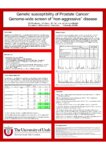 |
Camp, Nicola J. | Genetic susceptibility of prostate cancer: genome-wide screen of "non-aggressive" disease | Research has consistently shown that genetics plays a critical role in prostate cancer (CaP) development, but the identification of CaP genes has proven to be very difficult. Hereditary prostate cancer is a complex disease believed to involve numerous genes and variable penetrance. It has been propo... | CaP genes; Prostate cancer; Non-aggressive; Utah Population Database; Trapeze Interactive Poster | 2009 |
| 6 |
 |
Camp, Nicola J. | Genome-wide linkage analysis for aggressive prostate cancer in Utah high risk pedigrees | Research has consistently shown that genetics plays a critical role in prostate cancer (CaP) development, but the identification of CaP genes has proven to be very difficult. Hereditary prostate cancer is a complex disease involving numerous genes and variable phenotypic expression. This heterogene... | Linkage analysis; Aggressive prostate cancer; CaP genes; ICPCG; Utah; Trapeze Interactive Poster | 2009 |
| 7 |
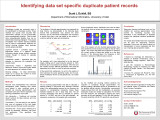 |
DuVall, Scott L. | Identifying data set specific duplicate patient records | Probabilistic models are commonly used in the identification of duplicate records. These methods are usually more accurate than deterministic methods, but are exponentially more computationally complex. Thus to make them computationally feasible, they rely on deterministic blocking strategies. Th... | Probabilistic models; Duplicate records; Duplicate patient records; Trapeze Interactive Poster | 2009 |
| 8 |
 |
Kestle, John R. W.; Simon, Tamara Danielle | Infection rates following initial cerebrospinal fluid shunt placement across pediatric hospitals in the United States | Object. Reported rates of CSF shunt infection vary widely across studies. The study objective was to determine the CSF shunt infection rates after initial shunt placement at multiple US pediatric hospitals. The authors hypothesized that infection rates between hospitals would vary widely even after ... | Shunt placement; Pediatric neurosurgery | 2009 |
| 9 |
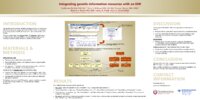 |
Mitchell, Joyce A. | Integrating genetic information resources with an EHR | The integration between the electronic health record (HER) and on0line information resources, using tools such as "infobuttons", is considered a promising solution to fulfill clinicians' information needs at the point-of-care. This article describes the implementation of "infobutton" links from a... | Electronic health record; HER; Infobutton links; Genetics Home Reference; GHR; GeneTests; Genetic information resources; Trapeze Interactive Poster | 2009 |
| 10 |
 |
Dailey, Andrew T. | Magnesium efficacy in a rat spinal cord injury model | Object. Magnesium has been shown to have neuroprotective properties in short-term spinal cord injury (SCI) studies. The authors evaluated the efficacy of magnesium, methylprednisolone, and magnesium plus methylprednisolone in a rat SCI model. Methods. A moderate-to-severe SCI was produced at T9-10 ... | Methylprednisolone; Spinal cord injury; Rat model | 2009 |
| 11 |
 |
Couldwell, William T.; Harnsberger, H. Ric | Oronasopharyngeal chordomas | Background: Chordomas are rare tumors derived from notochordal remnants. The authors report on a series of three cases of primary familial oronasopharyngeal chordomas treated at our institution. Methods: A retrospective chart review was completed of the three cases of primary familial oronasopharyng... | Oronasopharyngeal; Chordoma; Pharynx; Notochord; Transoral; Skull base | 2009 |
| 12 |
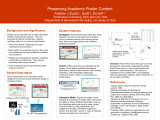 |
DuVall, Scott L. | Preserving academic poster content | Posters are an important way to share information between academia and industry. They are presented at national conferences, regional meetings, and even in university departments. There were almost 75,000 calls for poster submissions last year alone. Most posters are presented for only a few hours... | Poster preservation; Trapeze Interactive Poster | 2009 |
| 13 |
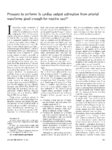 |
Gardner, Reed M. | Pressure to Perform: Is Cardiac Output Estimation from Arterial Waveforms Good Enough for Routine Use? | Biomedical Informatics | | 2009 |
| 14 |
 |
Wever Pinzon, Omar Enrique | Sudden cardiac death in young competitive athletes due to genetic cardiac abnormalities | Sudden cardiac death (SCD) in young athletes is generally caused by inherited cardiac disorders. While these events are relatively few compared to other cardiac deaths, they are tragic in that death occurs in a young, otherwise healthy person. The genetic abnormalities most associated with SCD are h... | | 2009 |
| 15 |
 |
Camp, Nicola J. | SumLINK statistic for linkage analysis: application to the ICPCG pooled linkage resource | We propose a novel, genome-wide, linkagebased statistic, "sumLINK," for identification of disease susceptibility loci. Our approach focuses primarily on "linked" pedigrees (those with pedigree-specific LOD ? 0.588; equivalent to unadjusted p ? 0.05) to identify regions of extreme consistency across ... | SumLINK; Linkage analysis; ICPCG; Disease susceptibility loci; Trapeze Interactive Poster | 2009 |
| 16 |
 |
Camp, Nicola J. | Survey of excess familiality in prostate cancer | Prostate cancer (PCa) is the most commonly diagnosed cancer among men, and has long been recognized to occur in familial clusters. However, identification of genes predisposing individuals to prostate cancer has been difficult. Putative PCa predisposition loci identified by genetic linkage have been... | Prostate cancer; Utah Population Database; Linkage analysis; Familial compotent; Excess familiality; Trapeze Interactive Poster | 2009 |
| 17 |
 |
Dailey, Andrew T. | Thoracolumbar spine trauma classification: the Thoracolumbar Injury Classification and Severity Score system and case examples | Object. The aim of this study was to review the Thoracolumbar Injury Classification and Severity Score (TLICS) and to demonstrate its application through a series of spine trauma cases. Methods. The Spine Trauma Study Group collaborated to create and report the TLICS system. The TLICS system is re... | Thoracolumbar spine trauma; Classification; Thoracolumbar injury; TLICS; Spine Trauma Study Group; Thoracolumbar Injury Classification and Severity Score | 2009 |
| 18 |
 |
Dailey, Andrew T.; Brodke, Darrel S. | Timing and influence of MRI on the management of patients with cervical facet dislocations remains highly variable: a survey of members of the Spine Trauma Study Group | Background: Traumatic cervical facet dislocations are potentially devastating injuries. Magnetic resonance imaging (MRI) is an excellent means of assessing ligamentous disruption, disk herniation, and compression of the neural elements. However, despite an improved understanding of these facet dislo... | Cervical facet dislocations; MRI; Spine Trauma Study Group | 2009 |
| 19 |
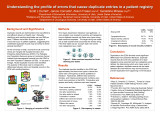 |
DuVall, Scott L. | Understanding the profile of errors that cause duplicate entries in a patient registry | Duplicate records are detrimental to the cost-effective and efficient delivery of health care. Manually identifying and resolving duplicates can cost $60 per case. Patterns have been found in the types of errors that occur in patient registries, suggesting that undetected duplicate records may be ... | Duplicate records; Duplicate patient records; Profile of errors; Enterprise Data Warehouse; EDW; Utah Population Database; UPDB; Trapeze Interactive Poster | 2009 |
| 20 |
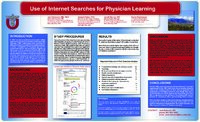 |
Dolcourt, John L.; Hales, Joseph W. | Use of internet searches for physician learning | INTRODUCTION In 2005 the American Medical Association (AMA) approved the structure for awarding continuing medial education (CME) credit to physicians searching the Internet for answers to point-of-care related questions. Previous investigations of how physicians use the Intenet have relied on... | Trapeze Interactive Poster | 2009 |
| 21 |
 |
Dailey, Andrew T.; Brodke, Darrel S. | Utility of helical computed tomography in differentiating unilateraland bilateral facet dislocations | Objective: Diagnosis of cervical facet dislocation is difficult when relying on plain radiographs alone. This study evaluates the interobserver reliability of helical computed tomography (CT) in the assessment of cervical translational injuries, correlates the radiographic diagnosis with intraoper... | Facet dislocations; Helical computed tomography; Spinal trauma | 2009 |
| 22 |
 |
Couldwell, William T. | Unruptured posterior communicating artery aneurysm presenting with gustatory seizures and temporal lobe edema | Unruptured cerebral aneurysms presenting with seizures are unusual. We describe a case of a growing middle cerebral artery aneurysm presenting with gustatory seizures with magnetic resonance imaging showing peri-aneurysmal edema. This case is the first to show temporal lobe edema associated with inc... | Seizure; Brain edema; PCOM | 2009-04 |
| 23 |
 |
Hall, Eric S. | Aiding clinicians through summarization of perinatal data | Exploratory analysis has focused on developing summarized views of monitor-captured perinatal data to support adherence to established clinical protocols. In addition to facilitating rapid access to significant clinical trends and reducing subjective interpretation of monitor-captured data, combini... | Perinatal data; Perinatal care; Trapeze Interactive Poster | 2009-09-23 |
| 24 |
 |
Schmidt, Meic H. | Assessment of the reliability of the Enneking and Weinstein-Boriani-Biagini classifications for staging of primary spinal tumors by the spine oncology study group | Despite advances in the treatment of primary spinal tumors in recent years, the with respect to the feasibility of oncologically appropriate surgical treatment and the selection of the optimal surgical approach. These tumors are relatively rare, comprising 11% of all primary musculoskeletal tumors a... | | 2009-01-01 |
| 25 |
 |
DuVall, Scott L. | Automatic, near real-time reporting of communicable diseases via web syndication | Real-time, automatic surveillance of reportable diseases remains an obstacle in Public Health. Reports are generated manually by healthcare provided and sent to local or state public health offices. Web syndication is the way to publish and transmit information to subscribed users. This is typicall... | Web syndication; Electronic reporting; Real-time reporting; Trapeze Interactive Poster | 2009-09-23 |

























